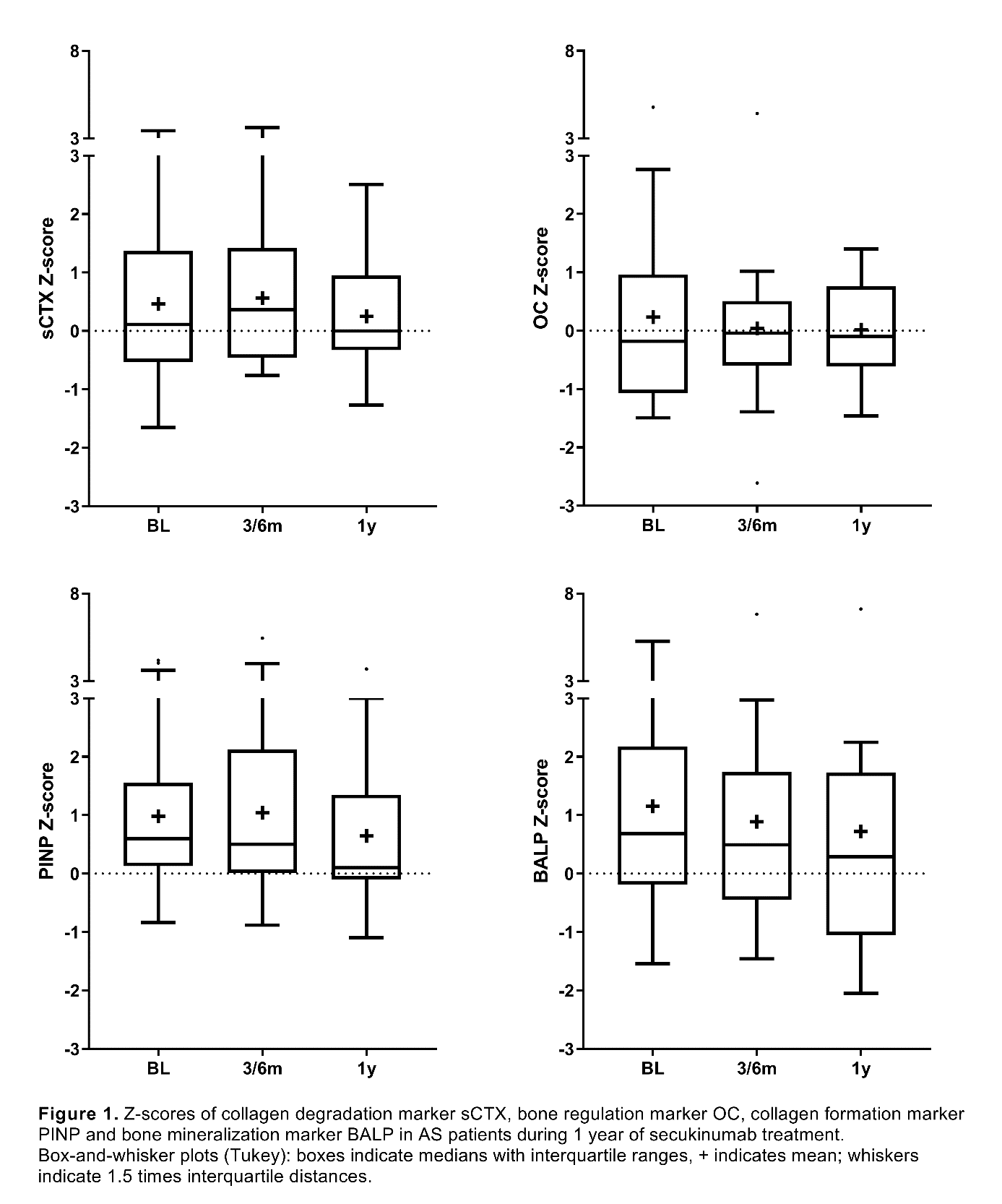Session Information
Date: Saturday, November 12, 2022
Title: Spondyloarthritis Including PsA – Treatment Poster I: AxSpA
Session Type: Poster Session A
Session Time: 1:00PM-3:00PM
Background/Purpose: In patients with ankylosing spondylitis (AS), TNF-α inhibitors influence the course of serum bone turnover markers (BTM), favoring an increase in mineralization during the first years1. Little is known about the effect of IL-17 inhibitors on these serum BTM levels. Objective of this study was to evaluate serum markers of bone resorption, formation, and mineralization during 1 year of secukinumab treatment in AS patients in daily clinical practice.
Methods: Included were consecutive outpatients from the GLAS cohort with a clinical diagnosis of AS who started treatment with secukinumab between April 2016 and June 2020, and had available serum samples at ≥1 visit. Standardized follow-up visits were performed at baseline (before start of secukinumab) and after 3 or 6 months and 1 year of treatment. BTM were measured in serum: osteocalcin (OC; regulation marker), serum type 1 collagen C-telopeptide (sCTX; collagen resorption marker), procollagen type 1 N-terminal peptide (PINP; collagen formation marker) and bone-specific alkaline phosphatase (BALP; bone mineralization marker). BTM Z-scores were calculated using a healthy reference population to correct for the normal influence of age and gender. Patients using bisphosphonates were excluded from analyses. Data was coded missing if patients experienced a fracture or received systemic corticosteroids within 1 year of a study visit. Generalized estimating equations were used to analyze BTM Z-scores over time within patients.
Results: In total, data of 26 AS patients were eligible for analyses; 50% were male, mean age was 46.0±14.6 years, 81% were HLA-B27 positive, mean ASDAS at baseline was 3.7±1.0, and 50% was TNFi naïve. Before secukinumab treatment, median PINP and BALP Z-scores were +0.6 and +0.7 SD, respectively, compared to age and gender matched healthy controls, however, the large majority remained within the normal range of ±2 SD. Overall, BTM Z-scores of OC, sCTX, PINP and BALP did not change significantly compared to baseline during the 1st year of secukinumab treatment (Figure 1).
Conclusion: In daily clinical practice, serum BTM levels including mineralization corrected for the normal influence of age and gender did not change during the 1st year of secukinumab treatment in patients with AS. Our data confirm recent findings of stable BTM levels at group level during 2 years of secukinumab treatment in posthoc analysis of MEASURE 12.
References:
1:Arends et al. Arthritis Res Ther. 2012;14(2):R98
2: Braun et al. BMC Musculoskelet Disord 22, 1037 (2021
To cite this abstract in AMA style:
Siderius M, Arends S, Wink F, Spoorenberg A. No Change in Serum Levels of Bone Turnover Markers Corrected for Age and Gender During the First Year of Secukinumab Treatment in Patients with Ankylosing Spondylitis [abstract]. Arthritis Rheumatol. 2022; 74 (suppl 9). https://acrabstracts.org/abstract/no-change-in-serum-levels-of-bone-turnover-markers-corrected-for-age-and-gender-during-the-first-year-of-secukinumab-treatment-in-patients-with-ankylosing-spondylitis/. Accessed .« Back to ACR Convergence 2022
ACR Meeting Abstracts - https://acrabstracts.org/abstract/no-change-in-serum-levels-of-bone-turnover-markers-corrected-for-age-and-gender-during-the-first-year-of-secukinumab-treatment-in-patients-with-ankylosing-spondylitis/

